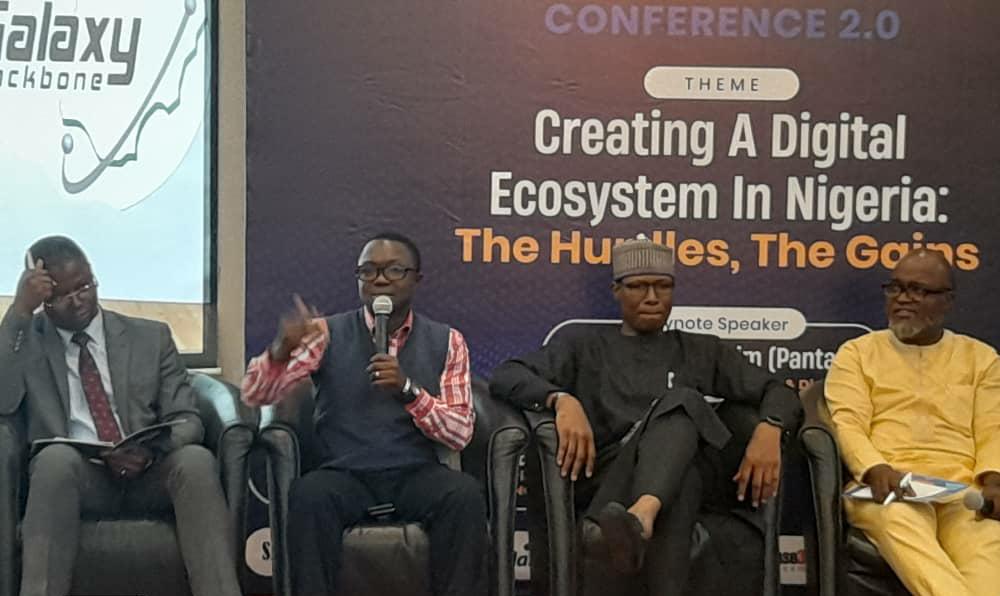By Patrick Aigbokhan
Stakeholders in the country’s information and communications technology (ICT) sector have charged Nigerians to brace up for the disruptions occasioned by the emergence of modern technologies, especially now that the country is on the verge of experiencing the Fifth Generation (5G) network commercial services.
The stakeholders spoke during a panel session at the ICT Growth Conference 2.0 organized by the Nigerian Information Technology Reporters’ Association (NITRA), which was held on Thursday at Oriental Hotel, Lekki Lagos.
At the first panel discussion on the topic, “The Roles of Emerging Technologies in Bridging Nigeria’s Digital Divide and Exploring Funding Options For Driving Digital Economy,” the Stakeholders noted that challenges of the post-COVID-19 era have birthed such life-transforming technologies like Artificial Intelligence (AI), becoming part of human existence.
Engr. Gbenga Adebayo, Chairman of the Association of Licensed Telecommunications Operators of Nigeria (ALTON), said modern technologies are today challenging our way of life and our mindset, noting that technologies will continue to be more disruptive.
He said, “The fact remains that the world is moving with the speed of light, and technology is moving with the same speed. We cannot be always ready for all things, but we can be ready to be receptive to things coming,
“When new technologies are coming, do we have the capacity to withstand them? We must be ready to adapt to those things when they come. With what we have, we will be able to take care of what is coming.”
The ALTON leader noted that the absence of basic infrastructure such as reliable power supply has led to the influx of inverter batteries into the country’s economy, and has further increased cases of vandalization of telecom infrastructure in the country.
“Sites are being vandalized, batteries stolen, about 400 fibre cuts recorded across the country. Certainly, this will be a threat to whatever we have achieved. The threat we have on our local infrastructure has made telecom service expensive,” Adebayo said.
While also contributing to the panel discussion, Mr. Ajibola Olude, Executive Secretary of the Association of Telecommunication Companies of Nigeria (ATCON), who represented the Association’s Chairman, Engr. Ikechukwu Nnamani, stated that emerging technologies have not only contributed to bridging the country’s digital divide but have also contributed immensely to advancing a better life for the citizenry.
He said that government should see telecom operators as development partners and intensify efforts in creating an enabling environment for telecom service providers to contribute their own quota to bridging the digital divide.
Mr. Destiny Amana, President of the Nigeria Internet Group (NIG), who represented the Nigeria Internet Registration Association (NiRA) at the panel, stated that the digital divide could mean one or two things depending on the prism from which one is seeing it.
Amana emphasized the dire need for the country to put in place those basics that will guarantee digital divide bridging.
“There is no doubt that emerging technologies are disrupting a lot of traditional institutions, making life easier for people, and giving everyone the opportunity to lead a fuller life and be prepared for a future powered by technology. Nigeria cannot afford to be in the background while other nations take the front seat in promoting the adoption of those things that bridge the digital gap,” Amana said.
On funding options, the panelists were of the consensus that multiple taxations on service providers should be stopped across the country, while Foreign Direct Investment should continue to be encouraged through the provisioning of an enabling environment that would guarantee ease of doing business.
The session was moderated by Mr. Yemi Adepetun, Senior Correspondent at Guardian Newspapers, who highlighted the need for all strata of government to work in collaboration with the private sector to achieve the height envisaged in 5G adoption in Nigeria.


